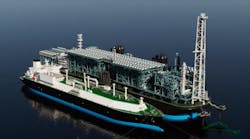Policymakers seek regulatory frameworks as offshore CCS market emerges
By Sarah Y. Dicharry and Justin Marocco, Jones Walker LLP
Interest in offshore carbon capture and sequestration (CCS) projects continues to gain momentum, and development of the regulatory frameworks necessary to facilitate those projects is underway. The State of Louisiana already has a regulatory framework applicable to CCS projects in State waters, which implicate a vast array of permits and approvals from both state and federal regulators. For federal waters, the Department of the Interior (Interior) has statutory authority to permit CCS projects, but it is still in the process of developing a regulatory framework to implement this authority. The goal here is to provide a brief introduction to the developing frameworks that apply to offshore CCS projects in Louisiana’s coastal waters and on the Outer Continental Shelf.
Carbon sequestration in Louisiana state waters
To construct a CCS project in Louisiana’s coastal waters, a company must obtain storage and other “real estate” rights (e.g., for wells, pore space, pipelines) from the State. This is generally accomplished through an operating agreement. The Louisiana State Mineral and Energy Board relies on a form Carbon Dioxide Storage Agreement for issuance of CCS operating agreements. The State could alternatively issue a lease to cover the CCS activities, but to date, interested parties have relied on operating agreements for CCS projects on State lands. Both the State and operators of CCS projects generally prefer operating agreements over leases because the operating agreement approach provides more flexibility for negotiation on a case-by-case basis. Nevertheless, to date, the State Mineral and Energy Board has not issued an operating agreement for a CCS project in the state’s coastal waters.
In addition to an operating agreement with the state, a CCS project in the state’s coastal waters also implicates a complex series of permits and approvals from various agencies at both the state and federal levels. For instance, a Coastal Use Permit (CUP) issued by the Louisiana Department of Energy and Natural Resources Office of Coastal Management (OCM) is required for construction and operation of projects within the Louisiana Coastal Zone. And a single CCS project may require more than a single CUP. Additionally, permits issued by the Army Corps of Engineers under Section 10 of the Rivers and Harbors Act and Section 404 of the Clean Water Act (10/404 Permit) would also be required. Given the extensive overlap between CUPs and 10/404 Permits, the OCM and the Corps have a joint permit application process, which facilitates concurrent review and issuance of both the CUP and the 10/404 Permit.
Separately, the Safe Drinking Water Act (SDWA) creates an overlapping federal and state regulatory framework for underground injection wells. Although the Environmental Protection Agency (EPA) is generally charged with implementation of the SDWA, the SDWA allows states to assume primacy for regulation and enforcement of the SDWA requirements. In 2024, Louisiana received primacy with respect to Class VI injection wells, which are necessary for CCS projects (which involve geologic sequestration) beneath state waters. Notwithstanding its primacy, Louisiana implements the SDWA in a cooperating and coordinating manner with the EPA in connection with its Class VI well program. Several other permits or authorizations for projects in Louisiana’s coastal waters might be implicated for any given project.
Carbon sequestration in federal waters
Under the Outer Continental Shelf Lands Act (OCSLA), the Department of the Interior has administered an offshore federal leasing program for decades. Historically, Interior’s authority under OCSLA was tied to the exploration, development, and production of oil and gas. However, in response to concerns about climate change and the advancement of technologies for alternative sources of energy and for carbon sequestration, Congress has gradually broadened the scope of that authority. Thus, in 2021 Congress passed the Infrastructure Investment and Jobs Act (IIJA), which expanded Interior’s authority under OCSLA to include authorizations for CCS in offshore federal waters.
EXCLUSIVE CONTENT:
Analysis: Recent executive orders creating chaos for companies operating under the IRA and the IIJA
Businesses hoping to secure funding under these Biden-era laws face challenges due to the broad scope of the EOs.
By Glenn Legge, Endeavor Management
The IIJA directed Interior to promulgate regulations implementing Interior’s authority under the IIJA to authorize CCS projects offshore within one year of IIJA’s enactment. Although Interior has begun assessing storage resource potential on the Outer Continental Shelf, it has not yet proposed regulations addressing its expanded authority under the IIJA. Therefore, how Interior will implement its authority under the IIJA to authorize offshore CCS activities remains to be seen.
Notably, whereas OCSLA contains dozens of detailed provisions establishing a general framework for the oil and gas leasing program (e.g., development of a five-year leasing program, certain mandatory lease provisions, minimum royalty rate, plans required throughout the life of a lease), the statutory provisions specifically addressing CCS are scant and generally focus on Interior’s authority to permit CCS projects on the OCS (but not on activities conducted pursuant to such authorizations). Thus, Interior’s regulations presumably will develop both the general framework for CCS authorizations and the details regarding operations pursuant to CCS authorizations.
In the absence of an extensive statutory framework to guide Interior’s regulations for offshore CCS, Interior might look to the Bureau of Land Management’s procedures for onshore CCS authorizations (issued pursuant to the Federal Land Policy and Management Act) or even to Louisiana’s (or another coastal state’s) offshore framework for guidance.
Interested in more offshore Louisiana content?
About the Author

Sarah Dicharry
Sarah Dicharry is a partner in Jones Walker’s Litigation Practice Group. In that role, she counsels energy industry clients regarding compliance with federal statutes and regulations, represents clients in response to government-initiated enforcement actions, and also works with clients in administrative and judicial appeal proceedings.

Justin Marocco
Justin Marocco is a partner in Jones Walker’s Litigation Practice Group and is a co-leader of the firm’s property and personal injury team. In that role, his primary focus is on handling a broad array of complex commercial litigation in the energy, maritime, construction, and environmental sectors.




